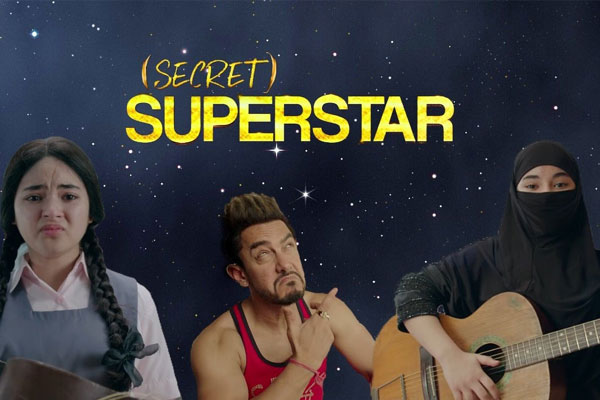
Two films made in what seem like two different parts of the planet, but set in India, have mothers and guitars at their core.
Secret Superstar, produced by Aamir Khan, had no problems with budget or distribution—it gets a big Diwali release with massive marketing support. In this film directed by Advait Chandan, Insiya, a young Muslim girl from Baroda (played by Dangal’s Zaira Wasim), has an abusive father (Raj Arjun), but her mother (Meher Vij) makes sure the girl has everything that is in her power to give. A guitar to help along with her singing talent, and a laptop to give her a window to the world of opportunity. For Zaira, music is what will help them escape from their dreary existence, where they come alive only when the nasty father is away for work.
Insiya has a kindred spirit in Rima Das’s Dhunu, the spirited heroine of Village Rockstars, which won the golden gateway prize for best film in the India Gold competition, at recently concluded Mumbai Film Festival.
Dhunu (Bhanita Das) and her band of boys pretend to play music on instruments made out of thermocol and glitter paper. But, despite the family’s grinding poverty, her widowed mother (Basanti Das), supports her daughter’s dreams, while acknowledging that her son (Manabendra Das) is good-for-nothing.
The kids go barefoot to school and often eat just rice and salt, because there is no money for a proper meal. The floods destroy the family’s small farm every year. Dhunu asks her mother, why she even bothers to work on the farm, and the skinny, weather-beaten woman replies that hard work is the only ‘dharma’ they have. Still, Dhunu dreams of having a real guitar one day—not better food, not more clothes or a pair of shoes, but a guitar—perhaps a means of escape from poverty.
Dhunu runs around with the village boys, climbing trees and splashing in ponds. When she is admonished by the village women for being a tomboy, her mother fights back on her behalf. The mother-daughter bond is heart-warmingly strong, whether she is removing lice from the child’s hair or teaching her to swim (her husband had drowned during a flood, because he could not swim). When Dhunu helps neighbours harvest betel nuts for money, and proudly hands over the meager earning to her mother, she objects to her daughter working for other people. “Don’t I feed you?” she says sadly.
Insiya has technology and Bollywood to realise her goals, Dhunu has nothing but hope. Still, the two are connected with an invisible thread, and represent the millions of girls getting ahead with the encouragement of their mothers, who were now even allowed to dream for themselves.
How Rima Das made Village Rockstars is in itself a story of great determination. She is the director of the film and also producer, writer, production designer, cinematographer and editor. She shot the film in her own village of Chhaygaon in Assam, over three years with just a cousin to assist her. The protagonist is also a cousin, and the others all real villagers.
Through her film, the audience discovers a slice of India that is not usually seen. Village Rocktars has a calm unhurried pace; there is the drama of real life, not heightened emotions. Their poverty does not stop the kids from enjoying what they have in the form of natural beauty, friendship, a sense of mischief tempered with responsibility. In a lovely scene, Dhunu visits her friend Bolo who is washing vessels. She pumps the water, and then sits down to help him.
Village Rockstars is the toast of the film festival circuit, proving, what Dhunu says (unwittingly paraphrasing Paolo Coelho), that if you want something badly enough, you get it. There is no gainsaying the power of dreams.
(Deepa Gahlot is a critic, columnist, editor, author and curator)



